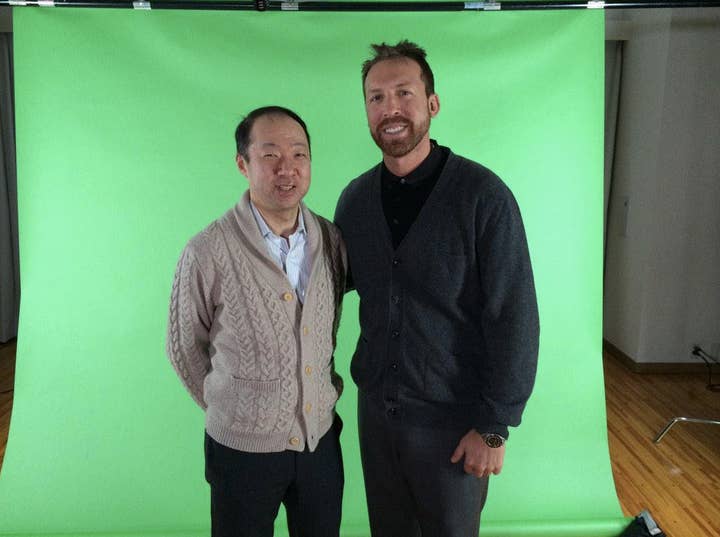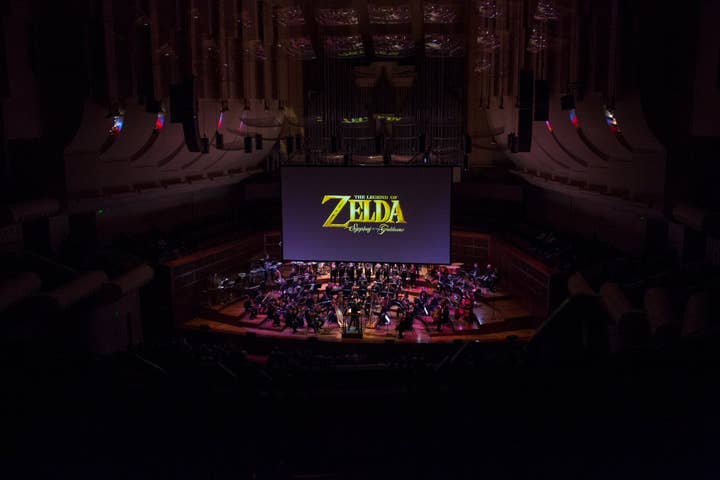Zelda concert producer: "I just want to bring video game music to the masses"
Jason Michael Paul looks back on 14 years of creating video game concerts
While living in Japan, concert promoter and producer Jason Michael Paul saw Koichi Sugiyama conduct a Dragon Quest symphony.
As a gamer in his mid-20s, it was something Paul was delighted to witness. And it was here that he developed an idea that would go on to define his career.
"That was when I had a lightbulb moment in my head," Paul tells GamesIndustry.biz. "I was working with Luciano Pavarotti, and I was wondering how I could create a hybrid show that replaces an artist like Luciano Pavarotti with the game. I wanted the game to be the artist.
That has always been the concept. The visuals have always been kind of secondary; it was all about the music. I thought if I could marry the two, then we would be onto something."
"People who would describe this as muzak or elevator music, and those people were the musicians themselves"
After striking up a relationship with Square Enix, Paul began producing a series of shows [plus a CD] focused on Final Fantasy, which started in 2004. Gamers were on-board with the marriage between the revered art form of symphonic orchestras with the more derided world of video games.
Unfortunately, that wasn't quite the case in the music world.
"I was getting a lot of resentment," Paul says. "A lot of backlash and naysayers, and people who would describe this as muzak or elevator music, and those people were the musicians themselves in the LA Philharmonic [who performed the Final Fantasy music]. Of course, the head of the Los Angeles Philharmonic at the time told the LA Times that it was a 'virtual riot at the Box Office'. That's all they care about. Does it sell tickets? Yes. That's what it comes down to.
"The orchestra members will always be - and I wouldn't say all of them, but definitely a lot of musicians are unfortunately used to playing standard rep. They are used to playing a lot of the classics. For a lot of musicians, this sort of concert is a treat. They get applause. They get recognised for the musicianship. These audiences roar, and they're also very quiet and respectful during the performance. So you have a raucous audience, which is very polite when they need to be. And the musicians after the show are all thanking you, because it is such a wonderful experience. I get a lot of satisfaction from that."

Indeed, Paul brought the Tuscany Symphony Orchestra to London this week to perform video game music. Once they'd finished with the show, the musicians bowed to the crowd whilst pretending to use their instruments as bows and arrows; the brass section even put their trumpets on their heads. It's hard to imagine that happening after a rendition of Mozart.
"The [resentment] has become less and less over time," Paul says. "I have done over 280 performances all around the world, so as you can imagine I've done a lot of convincing. And not by talking about it, but by making them happen. The scores are beautifully written. This show has been designed like a Hollywood sound stage, but live."
In 2011, Jason Michael Paul's production company teamed up with Nintendo to create a concert to mark the 25th anniversary of The Legend of Zelda. It was a dream for Paul, who had previously introduced some Mario music into one of his other productions.
"That's how I met Koji Kondo," he says. "I actually received a letter from Miyamoto, who thanked me for featuring their music in our show. It was almost like... Who is this guy? He's thanking me? I should be thanking him! But he is just so... all the stories are true."
The Zelda concerts were put together by a big production team initially, although Paul later stripped it right back. He now manages everything about The Legend of Zelda: Symphony of the Goddesses, including the show's merchandise and even flying to Japan to record testimonials.
"All of it is curated by me. Everything has my DNA in it," he says. "Three years ago I decided to cut everyone loose and take it all over and operate on my own. I brought in a new producer and I changed the format of the show so it was more about the original creators, and less about the superfluous producers and people outside of it. I wanted the focus to be on Mr Aonuma [Zelda lead developer], Mr Miyamoto [Zelda creator] and Mr Kondo [Zelda composer].
"During the show, I start by introducing the orchestra and make a few announcements, then I pass over to a beautiful video message from Mr Miyamoto. I actually went to Kyoto to get the testimonials. I was with all these creators, and filmed them and I think it is a very nice addition to the show."

With more than 70 concerts a year, the challenge for Paul and his team is to keep the show fresh. This week's Zelda performance in London is the tour's second time in the UK this year, and yet almost every piece was different.
"Part of my model is to make it so that when I come to the same city, it is never the same show," he explains. "It will always be different. For example, I brought back Ballad of the Wind Fish, but with visuals this time. The show is formatted so that I can move things around. And of course, the overtures are updated, and we introduce new songs from new releases. Breath of the Wild will play a big part in this performance. So we continually add new material."
Breath of the Wild's music is quite a departure for Zelda - less epic and more understated. It fits the gameplay, but does it suit a symphony?
"The game's music allowed us to try something different," Paul acknowledges. "We've got the grass blowing in the wind to set the stage, and then the piano comes in and then the ducks quacking... combined with the symphony performance, it really works well.
"We've been having a lot of fun. Breath of the Wild has enabled us to do things that we've never been able to do before. We've combined in-game sound effects with the live performance."
The growth of the Zelda symphony has been joined by a number of other concerts dedicated to video games; whether that's the long-standing Video Games Live, or the Pokémon Symphony, or the Skyrim event, or Dear Esther Live, or the various Final Fantasy gigs. There's no shortage of musical events for gamers to go to.
"There is always more room for video game music concerts," Paul says. "The only way where it would be saturated is if we did a show tonight and then Video Games Live is doing a show tomorrow. The audience is growing, the awareness is growing, and with concerts like this I think it is increasing in demand. I am all for it. I just want to bring video game music to the masses."
Paul describes his symphony as "a machine". He has created a system with Zelda that could just as easily work with other IP. So could we see more Nintendo soundtracks performed by a live orchestra? A certain Italian plumber perhaps?
"Well... I have been proposing a lot of projects to Nintendo, and to be honest it's a little frustrating," Paul admits. "I have all these wonderful ideas and I've created this wonderful machine. But now we are talking about a hiatus [for the Zelda event]. Here we are on this high where we are doing over 70 shows a year with The Legend of Zelda, and then we've got nothing. But I am doing other things. I am working with Bethesda on the hopes of an Elder Scrolls concert. Nothing is confirmed at this point, but I am hopeful.
"I recently put together a really nice proposal for a Super Mario symphony"
"I am also pleased to say I am going in a different direction, in that I am producing the first ever National Geographic symphony.
"I recently put together a really nice proposal for a Super Mario symphony. And we'll see. Hopefully it will stick. I also had another concept called Super Smash Symphony, but that's not going to happen. It's too complicated."
Six years after the Zelda show first came to London (a night where Nintendo's developers appeared on stage and the whole event was hosted by Zelda Williams), the symphony returned to the same venue at Hammersmith Apollo. The orchestra is bigger, the technology more advanced and the show greatly improved. Most significantly, the venue was still sold out, and the merchandise stall was swarming with young fans eager to get their hands on a £40 Zelda conducting baton [from Wind Waker, of course].
Seeing all this play out, it seems unthinkable that we wouldn't see such events for most major video game IPs in the future.
"I see it as a way to bridge the gap so that the younger generation, the 20 year-olds and teenagers, can enjoy this sort of music," Paul says. "Based on the people I speak to, a lot of those who come to this show, this is their first concert, let alone a symphony concert. Having a relevant, popular cultural icon like The Legend of Zelda, and presenting it in a true symphonic format... I think it will be only natural that people will then be interested in going to other symphonies, gaming or otherwise."








